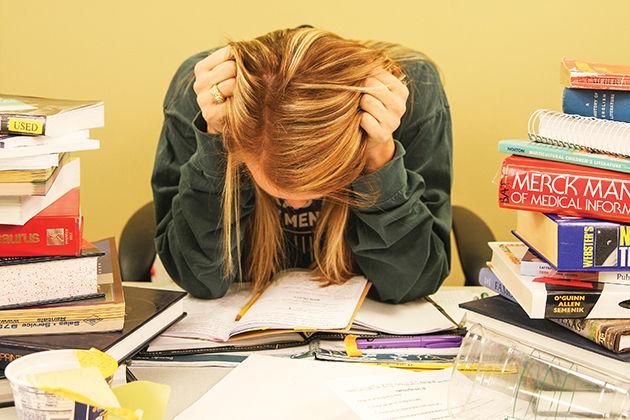Glazed over eyes, incoherent speech, a slow-stumbling walk, wrinkled clothes with yesterday’s lunch on it — these are some of the signs and symptoms of stress that affects students at Texas A&M during finals.
Symptoms also include low energy, headaches, upset stomachs, aches and pains, insomnia and an all-around sick feeling. The root of these symptoms are attributed to the drastic change in routine during finals week, said Mary Ann Covey, an associate director at Student Counseling Services.
“People develop their own eating habits, their own exercise habits, their own self-care habits, and when finals come, they abandon all of them,” Covey said. “‘During finals week I think I can get away with two hours of sleep a night,’ or ‘I never eat fast food and now I’m eating fast food two times a day.’”
Covey said the changes in a person’s daily routine have a direct correlation to the unpleasant side effects a student may experience when his or her stress levels are high.
“It all rolls into each other,” Covey said. “‘I’m already stressed. I’m already anxious, and now I’m not sleeping.’ It just makes everything worse.”
Chemical factors also play a role in the outward physical expression of stress.
Mary Meagher, a behavioral and cellular neuroscience professor at Texas A&M, said chemical responses begin whenever an individual decides something will be stressful.
“If you perceive that an event is beyond your capacity to cope, that is when you engage stress reactions,” Meagher said. “The cortex engages the limbic system, and then it talks to a region in the hypothalamus, which sends a signal to the pituitary to release a hormone called ACTH. That then circulates in your bloodstream and tells the adrenal gland to release the hormone cortisol, which is the chemical that gives you access to your energy reserves.”
While gaining access to more energy may sound like a good thing, Meagher said cortisol can cause wear and tear on your organ systems over time.
“For example, it can cause immune suppression if it is chronically released at high levels,” Meagher said.
Animal research has led to some startling similarities between the way humans and animals deal with stress, Meagher said.
“In both humans and animals they tend to neglect their physical appearance,” Meagher said. “Animals, when they are stressed, will stop grooming. They don’t seek pleasure that they normally would — they prefer sweet solutions over water and they become less interested in interacting socially.”
The best way for students to deal with stress is to take care of themselves, especially when it comes to sleep, said Martha Dannenbaum, director of Student Health Services.
“One of the reasons a college student’s life is so stressful is because every day is different,” Dannenbaum said. “The key thing people fail to do is pay attention to your sleep hygiene. You really need that seven hours of sleep — its restorative. Ensure that you are eating. Make time to take care of yourself.”
Symptoms also include low energy, headaches, upset stomachs, aches and pains, insomnia and an all-around sick feeling. The root of these symptoms are attributed to the drastic change in routine during finals week, said Mary Ann Covey, an associate director at Student Counseling Services.
“People develop their own eating habits, their own exercise habits, their own self-care habits, and when finals come, they abandon all of them,” Covey said. “‘During finals week I think I can get away with two hours of sleep a night,’ or ‘I never eat fast food and now I’m eating fast food two times a day.’”
Covey said the changes in a person’s daily routine have a direct correlation to the unpleasant side effects a student may experience when his or her stress levels are high.
“It all rolls into each other,” Covey said. “‘I’m already stressed. I’m already anxious, and now I’m not sleeping.’ It just makes everything worse.”
Chemical factors also play a role in the outward physical expression of stress.
Mary Meagher, a behavioral and cellular neuroscience professor at Texas A&M, said chemical responses begin whenever an individual decides something will be stressful.
“If you perceive that an event is beyond your capacity to cope, that is when you engage stress reactions,” Meagher said. “The cortex engages the limbic system, and then it talks to a region in the hypothalamus, which sends a signal to the pituitary to release a hormone called ACTH. That then circulates in your bloodstream and tells the adrenal gland to release the hormone cortisol, which is the chemical that gives you access to your energy reserves.”
While gaining access to more energy may sound like a good thing, Meagher said cortisol can cause wear and tear on your organ systems over time.
“For example, it can cause immune suppression if it is chronically released at high levels,” Meagher said.
Animal research has led to some startling similarities between the way humans and animals deal with stress, Meagher said.
“In both humans and animals they tend to neglect their physical appearance,” Meagher said. “Animals, when they are stressed, will stop grooming. They don’t seek pleasure that they normally would — they prefer sweet solutions over water and they become less interested in interacting socially.”
The best way for students to deal with stress is to take care of themselves, especially when it comes to sleep, said Martha Dannenbaum, director of Student Health Services.
“One of the reasons a college student’s life is so stressful is because every day is different,” Dannenbaum said. “The key thing people fail to do is pay attention to your sleep hygiene. You really need that seven hours of sleep — its restorative. Ensure that you are eating. Make time to take care of yourself.”





















